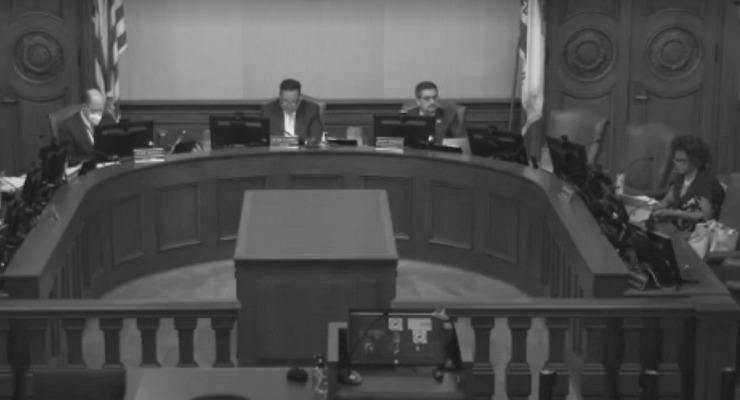 Becoming a sanctuary city and ending the Pasadena Police Department’s relationship to Immigration and Customs Enforcement (ICE) will be considered by the Pasadena City Council on March 27. At the City Council meeting, three progressive Pasadena organizations – NDLON (the National Day Laborers Organizing Network), CLUE (Clergy and Laity United for Economic Justice), and POP! (Progressives Organizing for Progress) – will advocate a Pasadena policing policy that would take the City completely out of cooperating with the federal Immigration and Customs Enforcement agency (“ICE”) and other measures that would make Pasadena truly a sanctuary City.
Becoming a sanctuary city and ending the Pasadena Police Department’s relationship to Immigration and Customs Enforcement (ICE) will be considered by the Pasadena City Council on March 27. At the City Council meeting, three progressive Pasadena organizations – NDLON (the National Day Laborers Organizing Network), CLUE (Clergy and Laity United for Economic Justice), and POP! (Progressives Organizing for Progress) – will advocate a Pasadena policing policy that would take the City completely out of cooperating with the federal Immigration and Customs Enforcement agency (“ICE”) and other measures that would make Pasadena truly a sanctuary City.
Some critics of the proposal to completely end all contacts between ICE and the Pasadena PD contend that it would risk the City’s continuing to receive federal funds. With the City already facing a structural budget deficit and its budget including about $35 million in federal funds, there can be no dispute that it would be a significant blow to Pasadena if the Trump administration could retaliate to Pasadena becoming a true sanctuary city by cutting off all federal funds.
But even more clearly than the wrecking of Trump’s Muslim travel bans by the law, the Trump administration attempt to cut off all federal funding would be derailed by current law. The actual risk of a retaliatory cut-off of federal funds is somewhere between non-existent to 1% of the $35 million Pasadena receives in federal funds. The possibility of a $35 million cut-off of federal funds is over-blown fear-mongering.
The law – Immigration enforcement is a federal responsibility
Sanctuary policies are consistent with federal law. In 1996, Congress enacted 8 U.S. § 1373(a) , which prohibits local and state governments and agencies from enacting laws or policies that limit communication with the Department of Homeland Security (DHS) about information regarding the “immigration citizenship status” of individuals. However, § 1373(a) does not impose an affirmative obligation on local or state governments to collect information regarding the immigration status of certain individuals, nor does it require these agencies to take any steps upon obtaining such information. In fact, doing so would violate the U. S. Constitution.
Requiring local or state governments to enforce federal immigration law would violate the Tenth Amendment of the United States Constitution. The Tenth Amendment prohibits federal government from coercing state and local governments to use their resources to enforce federal laws or regulations. Deportation is governed by federal immigration law and handled by the federal government. A number of cases have established that the federal government cannot compel cities to enforce federal laws. In Printz v. United States, in an opinion written by Justice Scalia, the U.S. Supreme Court held that local law enforcement officials did not have to carry out handgun background-checks on behalf of the federal government. Any attempts by the Trump administration to force local governments to carry out deportations on behalf of ICE would amount to “commandeering”, which is a violation of the Tenth Amendment and, ironically, it would violate the principles of federalism that conservatives have used to advocate for more states’ rights.
Moreover, policies that prevent police officers from inquiring about the immigration status of suspects or arrestees have been upheld by the Courts. In 2009, in Sturgeon v. Bretton, a California Court of Appeal dismissed a challenge to LAPD’s Special Order 40 when it found no conflict between federal immigration laws and LAPD’s policy directing its officers to not initiate police action with the sole objective of discovering a person’s immigration status.
In sum, sanctuary policies are an exercise of basic state and local powers, and absent a Court order, PPD is under no obligation to inquire about the immigration status of those they suspect to be undocumented, to hold them for ICE, or to share this information with ICE.
The law – Federal fund cut-offs require a close connection between their purpose and the City’s conduct
Can the Federal Government withhold funding from Sanctuary Cities?
Yes, but only to a limited extent. Last month, the Trump administration issued an executive order directing the identification of federal money it might try to withhold to punish sanctuary cities. However, the President’s power to withhold federal funds from the states is severely limited without the help of Congress. It is Congress, not the President, who has the ultimate power under the U.S. Constitution’s Spending Clause to allocate money to states or private entities and require them, as a condition to receiving those funds, to engage in certain activity or to refrain from certain activity. However, even that power has limitations.
Ironically, the conservative majority of the Supreme Court that struck down part of Obamacare established one of the strong precedents that would severely limit or prohibit the ability of the Trump administration to retaliate against sanctuary cities. In the 2012 NFIB v. Sebelius decision striking down part of Obamacare, the Supreme Court said that Congress couldn’t withhold all of a state’s Medicaid funding if the state didn’t vote to expand its Medicaid program because doing so would amount to a “gun to the head” of states. The Supreme Court thus made it clear that Congress cannot exert a power akin to undue influence. It limited the federal government’s ability to coerce states to adopt certain policies by threatening a loss of funding.
For the Trump administration to avoid being hauled into court once again and have its actions declared unconstitutional, it can only withhold funds if the money is directly tied to the behavior to which it objects. Because sanctuary cities by definition have no programs enforcing federal immigration law, it is problematic whether any federal funds could be cut off. At best, the Trump administration might be able to withhold funding from sanctuary cities for policing grants because of a cities’ failure to follow policing practices related to specific immigration enforcement but not unrelated grants the City already receives for things like Section 8 Housing subsidies, transportation, public health, workforce development, nutrition, public arts, and fire department grants. Moreover, Trump’s executive order has an exemption protecting grants deemed necessary for law enforcement purposes, so event cutting off any law enforcement grants is problematic.
Thus, the Trump administration cannot punish sanctuary cities by cutting off unrelated funds like housing and transportation, and probably can’t even cut off funding to sanctuary city police departments.
Pasadena’s federal funds – 0%-1% could arguably be related to immigration enforcement
 Pasadena could arguably lose between nothing and 1% of the money granted by the Federal government. In 2016, Pasadena received about $35 million in federal grants, with the bulk going to housing and transportation. Only $379,000 went to the police department. As the graph, the rest of those federal grants were for things such as Section 8 Housing subsidies ($17.8 million), Transportation ($7.8 million), public health ($3.5 million), workforce development ($3 million), nutrition ($1.7 million), public arts ($91,000), and the fire department ($379,000). The Trump administration cannot strip Pasadena of federal funds allocated to things like public health and workforce development, which are completely unrelated to policing and immigration enforcement. Thus, if the Trump administration had been able to withhold any federal funding as punishment for declaring Pasadena a sanctuary city based on 2016 figures, at most it could have withheld the 1% allocated to the police department. But the bulk of the federal money going to the Pasadena PD in 2016 was the one-time grant of $250,000 for body-camera purchase and implementation. That money has already been spent, and the City is awaiting the $250,000 reimbursement. Since the body-camera money was a one-time grant, the next budget for the PD presumably will represent only about 3/10ths of 1% of the City’s federal funds. And even those less substantial police funds are unlikely to be cut-off in retaliation for Pasadena becoming a sanctuary city.
Pasadena could arguably lose between nothing and 1% of the money granted by the Federal government. In 2016, Pasadena received about $35 million in federal grants, with the bulk going to housing and transportation. Only $379,000 went to the police department. As the graph, the rest of those federal grants were for things such as Section 8 Housing subsidies ($17.8 million), Transportation ($7.8 million), public health ($3.5 million), workforce development ($3 million), nutrition ($1.7 million), public arts ($91,000), and the fire department ($379,000). The Trump administration cannot strip Pasadena of federal funds allocated to things like public health and workforce development, which are completely unrelated to policing and immigration enforcement. Thus, if the Trump administration had been able to withhold any federal funding as punishment for declaring Pasadena a sanctuary city based on 2016 figures, at most it could have withheld the 1% allocated to the police department. But the bulk of the federal money going to the Pasadena PD in 2016 was the one-time grant of $250,000 for body-camera purchase and implementation. That money has already been spent, and the City is awaiting the $250,000 reimbursement. Since the body-camera money was a one-time grant, the next budget for the PD presumably will represent only about 3/10ths of 1% of the City’s federal funds. And even those less substantial police funds are unlikely to be cut-off in retaliation for Pasadena becoming a sanctuary city.
Pasadena as a Sanctuary City
Many progressive cities have declared themselves “sanctuary cities.” California is one of four states considering declaring itself a “sanctuary state”, even tough it already places some limits on the use of state resources to enforce federal immigration law. The term “sanctuary city” has no precise legal meaning, but it is generally used to refer to localities that limit or prohibit the use of funds or resources to enforce federal immigration laws. Some of these localities have enacted policies that prohibit or limit their police or employees from turning over residents or information on them to the U.S. Immigration and Customs Enforcement (“ICE”). The most recent locality in California to take this step is Santa Ana, the second largest city in Orange County. Other cities are considering moving in that direction.
Pasadena is not yet a sanctuary city. Pasadena adopted a resolution in October 2013, supporting the principle that “local governments should not be mandated to enforce federal immigration laws, particularly when resources necessary to enforce local laws are already stretched.” While Police Chief Sanchez reports that Pasadena has not carried out a coordinated operation with ICE since 2015, Pasadena does not prohibit police contacts with ICE. The Pasadena PD entered into an agreement with ICE shortly after Trump’s election that, if enforceable, would obligate it to dedicate its officers to support any ICE investigation or joint operation. To his credit, City Manager Steve Mermell declined to sign the ICE agreement. The sanctuary city policing policy proposed by NDLON, CLUE, and POP! would make it clear that Pasadena is not going to be in bed with ICE. The Pasadena City Council formally declaring that Pasadena is a sanctuary city would be an important symbolic statement, and a no-contacts-with-ICE policing policy would be a meaningful policy supporting Pasadena meaningfully being a sanctuary city.
Lizbeth Mateo is a recent law school graduate who is an organizer for POP! Skip Hickambottom and Dale Gronemeier are local civil rights attorneys.














 0 comments
0 comments


